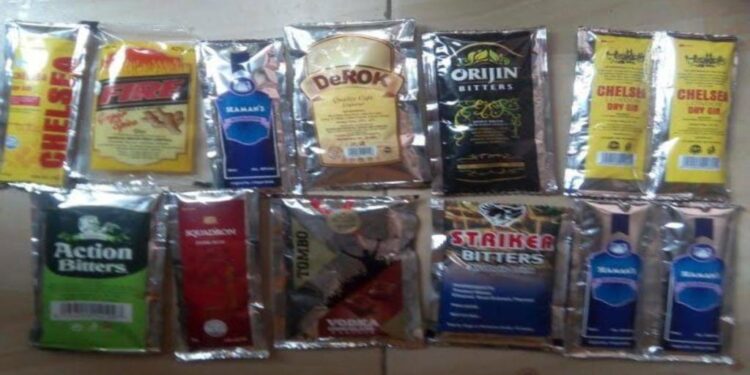Sachet alcohol sale continues at parks, NAFDAC awaits minister’s directive

The sale and use of alcoholic beverages in sachets and small bottles below 200ml continue despite the ban on the products over one month ago.
The National Agency for Food and Drug Administration and Control commenced the enforcement of the ban on the importation, manufacture, distribution, sale, and use of alcoholic beverages in sachets, PET, and glass bottles of 200ml and below on February 1, 2024.
The Director-General of NAFDAC, Prof Mojisola Adeyeye, at a press briefing in Abuja on February 5, said as of January 31, 2024, there was no alcoholic beverage in those categories that were registered by the agency.
Adeyeye said the decision was based on the recommendation of a high-powered committee of the Federal Ministry of Health, NAFDAC, Federal Competition and Consumer Protection Commission, and the industry represented by the Association of Food, Beverages and Tobacco Employers, Distillers and Blenders Association of Nigeria, in December 2018.
READ ALSO: Do Not Offer Bribe To Any Of Our People, Tinubu Tells Qatari Investors
However, the move to enforce the ban has generated repeated protests by distillers and labour unions, who said the ban would cost 500,000 workers their jobs, and ruin N800bn investments.
The Manufacturers Association of Nigeria countered claims by the NAFDAC that the recent implementation of the ban on sachet alcoholic drinks was a collective decision.
The House of Representatives also mandated its committee on NAFDAC to probe the circumstances surrounding the ban.
This was sequel to a motion moved on the floor of the Green Chamber by members Paschal Agbodike and Philip Agbese during one of its plenary session in February.
But NAFDAC has insisted on the ban, saying it was to safeguard the health of Nigerians, noting that alcohol in sachet and pet bottles was easily accessible to underage persons, including schoolchildren.
However, despite NAFDAC’s insistence, News Telly reports that the products are still sold without restriction at major parks in major cities, including Lagos and Abuja.
At major motor parks in the Federal Capital Territory – Lugbe, Area 1, Jabi, Airport junction, Wuse, Nyanya, and Mararaba, the sale of the products continue as usual and unfettered.
Also, at Obalende and Marina in Lagos, traders ignored the ban and continued to display sachet and pet bottle alcohol in full glare.
Asked on Tuesday if NAFDAC had stepped down the ban, its DG, Adeyeyem said, “It has not been stepped down. We are waiting for the ministerial directive for the next step.”
Last month, Adeyeye had told our correspondent exclusively that NAFDAC would collaborate with the National Union of Road Transport Workers to ensure the enforcement of the ban on the products.
“We intend to work with the NURTW to ensure the enforcement of the banned products. We surely will work on that, and ensure that they are stopped and phased out,” the NAFDAC DG said.
The World Health Organisation said no level of alcohol consumption is safe for health.
It described alcohol as a toxic, psychoactive, and dependence-producing substance classified as a Group 1 carcinogen by the International Agency for Research on Cancer decades ago – this is the highest risk group, which also includes asbestos, radiation and tobacco.
“Alcohol causes at least seven types of cancer, including the most common cancer types, such as bowel cancer and female breast cancer. Ethanol (alcohol) causes cancer through biological mechanisms as the compound breaks down in the body, which means that any beverage containing alcohol, regardless of its price and quality, poses a risk of developing cancer.
“The risk of developing cancer increases substantially the more alcohol is consumed. However, the latest available data indicate that half of all alcohol-attributable cancers in the WHO European Region are caused by “light” and “moderate” alcohol consumption – less than 1.5 litres of wine or less than 3.5 litres of beer or less than 450 millilitres of spirits per week.
“This drinking pattern is responsible for the majority of alcohol-attributable breast cancers in women, with the highest burden observed in countries of the European Union. In the EU, cancer is the leading cause of death – with a steadily increasing incidence rate – and the majority of all alcohol-attributable deaths are due to different types of cancers,” it stated.






